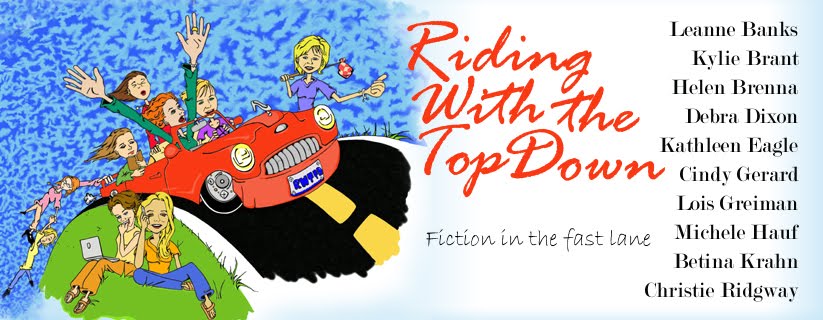
Welcome!
Sundays are days to rest , reflect, and recharge. So I thought today I'd take a moment or two to lift a Mimosa to our riders and readers, our book lovers and blog lurkers, our writing friends and this wonderful on-line community of ours.
Where would we be without each other?
I've learned a great deal from my on-line listmates and today I'll share my top five on-line writing lessons.
1. Conflict, conflict, conflict. It has to be in every scene I write, or it's not pushing the story forward. But conflict doesn't have to be Protag and Antag going at it fang and claw; conflict can be quiet, subtle, sexy, heartbreaking, even humorous. And there should probably be several ongoing conflicts if I'm going to sustain a 400+ page novel. Think about it: at any time there are all kinds of tensions and conflicts going on in the average human life. And we seldom write about Average characters.
2. That which doesn't annoy or discomfort me, probably isn't helping me grow. I love flattering comments and reviews; I suck in praise like nectar. But being called a genius or having my characters called the best in historical fiction (don't I wish!) doesn't tell me how I can improve my work. Having reviews or reader comments say that my book's start was slow or the characters fought a little too much, or that the ending was rushed-- that's something I can sink my teeth into and work to improve on the next book.
3. Someone will always do it better than me. And that's okay. Because I write my stories, from my experience and my heart. Being compared-- favorably or unfavorably-- to another writer is irrelevant. What I need to be is the best Betina Krahn I can be. Most days that's quite enough of a challenge.
4. There are a million roads to Oz. There is no one "right" way to do anything in a creative field like writing. What works like a clock for somebody else can bring me grinding to a halt. Believe me, I've tried "pantsing," "outlining," "spread sheeting," "color coded carding," and "post-it noting on the wall." None of them were are effective as my "synopsis and then write ignoring the synopsis" technique. Because no two writers write alike. For good reasons. I found a way that works and I'm hanging in there with it. While I keep my eye out for something better.
5. There is nothing new under the sun. No new plots. No new problems. No new publishing gambits. No new topics or subjects. . . only creative new twists and variations on the old ones. So relax and quit letting the pressures make you crazy. Enjoy painting and refining your colorful version of the wheel, instead of trying to invent it from scratch. Quit feeling like the Lone Ranger (note to self: pay attention here!) and get back to doing what you do best: putting the story on the page.
There you have them: my top five. Got any of your own you'd like to share? What have you learned from the on-line writing community? Have a seat, snag a mimosa, and let 'er rip.

8 comments:
ooh, let 'er rip. does this involve a whoopie cushion?
i can't believe i just said that.
one thing i've come to accept over the years is the fact that every book can't be five stars. i think some writers get hung up on making each book better than the last, and that's not always possible. there is some unexplainable X-factor that goes into a magical book, and it won't be there for all of them. it might be there for one or two or three over the course of a writer's career. and that's okay. i'm not saying we shouldn't try our best -- that's a given -- i'm just saying that magic can't happen every time, otherwise it wouldn't be magic. it would just be the norm.
cheers!
4:14 PM
Oh, my gosh, Betina! You want me to have a top 5 ? I'd be better at a top 50, so how about Today's Tip-of-my-tongue Top 5?
1. GMC. Goal, Motivation, and Conflict.
(Duh. Like you thought I was going to say ANYTHING ELSE as # 1??) You just can sustain a plot that grips the reader without those. They create the anchor, the bond and the worry that keep a reader glued to the novel.
2. You gotta Read to Write.
So many writers I talk with only read one kind of book or say they don't have time to read. You gotta read. It fills up the well and sparks creativity. If you're worried about un-/subconsciously mirroring someone else's ideas then read outside your genre. Read incredible non-fiction. But do read.
3. Be willing to try lots of different techniques until you find the ones that help you get words on paper.
A brilliant plotting system is no good to you if you aren't able to create pages. So explore lots of ways to approach a story and you'll eventually find the one or the combination of methods that help you find the heart and key to your story.
4. Embrace theme. Either by design or because we're hardwired that way, commercial writers have something to say. What are you trying to convey? What's your book about? Finding your theme sometimes help you find your voice.
5. Don't forget to be more than just your writing and books. Have a life. Enjoy your life. You'll have more to offer the empty page if you do.
there is some unexplainable X-factor that goes into a magical book, and it won't be there for all of them
Looking at this from a reader's perspective, I suspect that each reader will have her/his favourites based on what rings true for her/him, what speaks to her/his personal experience, or touches on themes which are of interest to her/him. Some readers will rave about one particular book by their favourite author, while other fans of the same author think a different book is her best. Even if you do your best as an author, it's not necessarily going to please everyone, but on the flip side, even a book you feel is not quite your best may be a favourite with some readers.
laura, you are so right about that. very nice point. i've even had books that spoke to readers in ways i'd never intended -- which really underlines the role a reader plays in a book, and how the reader brings herself to the story.
Laura, I second what Anne said-- Hi, Anne!-- some books touch on things in readers that we didn't see when we were writing the book. Funny how the muse works. . . and sometimes the whole is bigger than the sum of the parts!
About the magic thing. . . all we can do is show up at the blank page and do our best. I've had books that I personally thought were magic that never caught on sales-wise. But I stsill think of them as favorite god-kissed efforts.
Thanks for the lovely brunch conversation, guys! This is fun!
Betina
hi, betina! and did somebody say happy hour??? :D
Happy Hour - Wednesday!!
I'm getting revisions done on my second book and sending it off. And I think we can come up for a few more reasons to celebrate!!
Oh, and Betina, on-line wisdom I've picked up ... Writing is a solitary, sometimes isolating profession, but reaching out on-line is the next best thing to being there.
Post a Comment